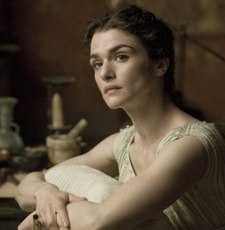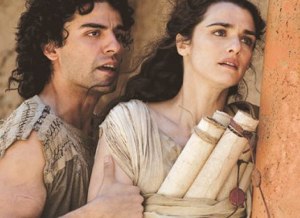REVIEW: Agora Strains to Keep Up With Its Own Staggering Vision
 Handsome to look at and driven by a passionate -- if not exactly precise -- political sensibility, Agora is this spring's highest-brow sandal epic, by an Egyptian cubit. Considering its competition is the lumpy Clash of the Titans and this week's video game-inspired Prince of Persia, it's an endorsement earned by a pretty wide margin of default. Director Alejandro Amenábar has chosen the story of Hypatia, a fourth century Greek mathematician, as the subject of his seventh film, and sets it in a marvelous recreation of ancient Alexandria. A dust-and-geometry biopic with blaring modern resonances is a risky move even for Amenábar, who has been drawn to challenges of genre (as with the understated horror picture The Others) and topical material (his lyrical meditation on the right to die, The Sea Inside,) over the course of his still-young career. Unfortunately the one expectation that can be attached to the director -- a gift for elegant, involving stories and consistent, inventive filmmaking -- is obscured by Agora's tendency toward the blandly overwrought.
Handsome to look at and driven by a passionate -- if not exactly precise -- political sensibility, Agora is this spring's highest-brow sandal epic, by an Egyptian cubit. Considering its competition is the lumpy Clash of the Titans and this week's video game-inspired Prince of Persia, it's an endorsement earned by a pretty wide margin of default. Director Alejandro Amenábar has chosen the story of Hypatia, a fourth century Greek mathematician, as the subject of his seventh film, and sets it in a marvelous recreation of ancient Alexandria. A dust-and-geometry biopic with blaring modern resonances is a risky move even for Amenábar, who has been drawn to challenges of genre (as with the understated horror picture The Others) and topical material (his lyrical meditation on the right to die, The Sea Inside,) over the course of his still-young career. Unfortunately the one expectation that can be attached to the director -- a gift for elegant, involving stories and consistent, inventive filmmaking -- is obscured by Agora's tendency toward the blandly overwrought.
Hypatia (the criminally luminous Rachel Weisz), privileged daughter of Theon (Michael Lonsdale), is a crack mathematician and astronomer who refers to herself as a "philosopher." The parlance of the time, perhaps, but it doubles as a feint: In an increasingly intolerant religious atmosphere, questioning the mysteries of the stars is considered blasphemous. Hypatia is cosseted by her father and the adoring group of students she teaches at the famous Alexandria library, perhaps because she seems to be the only female within the city limits. (Seriously: where do they keep them?) Though there are some Jews kicking around, most of Alexandria is Pagan, a faith of Greco-Roman extraction that Amenábar implicitly attaches to enlightenment and civilization, despite the fact that its elite has a pesky attachment to their slaves. This conflation presents the film's first narrative speed bump: The intrepid Christians challenging the establishment are defiantly anti-Pagan, but the initial conflict is not well defined. The sympathetic weight Amenábar places on the physical destruction of Pagan idols feels confused; is Paganism just another blood-soaked religion or the faith of choice for knowledge-seeking progressives?
Amenabár's take on the founding Christians, however, is clear: Though he briefly references the then-revolutionary concept of Christian charity, the faith is portrayed mainly as a haven for radical ideology. Shortly after Ammonius persuades Hypatia's slave Davus (Max Minghella) to give his master's bread to the poor, he is leading a mob of black-hooded marauders to destroy the library. The books don't burn -- they are scrolls, in fact -- but the point is clear. In one of a series of directorial oversells (he belabors both wonky low angles and ground-sweeping aerial shots), Amenábar follows the hail of scrolls as they fly up to the ceiling like streamers, then turns the frame fully upside down. Although the preceding battle scene is a riveting evocation of panic, confusion and utter brutality, its import is unclear: Are we meant to side with science or the Pagans? Is the one being made indistinguishable from the other for the purposes of narrative expedition?
 Confusion on this point gets the best of young Davus; his monster crush on Hypatia only clouds the matter further. A slave and faithful student made a little mental by unrequited love, he first turns to Christian prayer, naturally, to beg God for his mistress's favor. No one has yet clued him in to the concept of unholy urges, however, and rage -- rather than guilt -- becomes his animating emotion; he soon defects to the Christian militia. More constant, despite Hypatia's perversely asexual rebuffs (one involving the presentation of a used sanitary napkin), is Orestes (Oscar Isaac), a student and eventual convert who becomes a Roman prefect. Amenábar (who wrote the script with Mateo Gil) intersperses virtuoso battle scenes with windy, think-tank meditations on whether the earth in fact revolves around the sun; the integration is awkward and occasionally portentous, threatening this very earnest film with inadvertent camp. Weisz does her level best with a character who moves between wide-eyed theorizing and haughty slave-driving; there is simply not enough known about Hypatia for her to cohere as a character, an uncertainty reflected in Weisz's determined but uni-dimensional performance.
Confusion on this point gets the best of young Davus; his monster crush on Hypatia only clouds the matter further. A slave and faithful student made a little mental by unrequited love, he first turns to Christian prayer, naturally, to beg God for his mistress's favor. No one has yet clued him in to the concept of unholy urges, however, and rage -- rather than guilt -- becomes his animating emotion; he soon defects to the Christian militia. More constant, despite Hypatia's perversely asexual rebuffs (one involving the presentation of a used sanitary napkin), is Orestes (Oscar Isaac), a student and eventual convert who becomes a Roman prefect. Amenábar (who wrote the script with Mateo Gil) intersperses virtuoso battle scenes with windy, think-tank meditations on whether the earth in fact revolves around the sun; the integration is awkward and occasionally portentous, threatening this very earnest film with inadvertent camp. Weisz does her level best with a character who moves between wide-eyed theorizing and haughty slave-driving; there is simply not enough known about Hypatia for her to cohere as a character, an uncertainty reflected in Weisz's determined but uni-dimensional performance.
Having overthrown the Pagans, the Christians come calling for the Jews, and a holy war again breaks out in Alexandria's streets. A new Bishop (Sami Samir) with a bible-thumping bent turns his wrath definitively on heathens who would dare to question the word of God on the creation and the orbit of the earth; astronomers unlucky enough to also be women were doubly cursed. In the film's second act Amenábar draws a clear and chilling portrait of the divisive lines humans have felt compelled to lay down throughout history, the destructive instinct to define ourselves against each other.
Hypatia, who declares her only center to be the sun, is also the only character working in earnest to draw a direct line to the heavens (her experiments with gravity bookend the film). The irony is heavy and ultimately affecting -- a thousand years later Galileo will be jailed for doing similar work. The film's bleak conclusion becomes unbearable in context: Hypatia's death also signals the end of women in positions of intellectual prominence and the beginning of a period known -- not coincidentally -- as the Dark Ages.

Comments
Worth seeing.
I beg to differ! It is important to remember that in the 1-5th centuries as the Roman Empire broke up and faded away, well-off Christians as well as teh remaining "pagans" also kept slaves. (The educated, sophisticated urban Romans, Alexandrians, Athenians and even the northern citizens were both insulted and amused at being called "pagans", BTW.)
Later, the Islamic rulers of the Eastern Mediterranean & No Africa re-invented slavery in their own image. The custom returned -famously- during of Age of Exploration/Colonialism at the start of the Modern Age in Europe. It never left large parts of Asia, Pacifica, or Africa. The practice of owning other human beings: slaves, serfs, indentured servants - is hardly the purview of one culture or time period over another.
The primary focus of this film was not the "love triangle" - which Hypatia soundly rejected on all levels - but the clash of religion, the break down of the civil society at the end of an empire, ad the rise of mob rile manipulated by a man whose aim is that of amassing power and the woman who as at he focal point of those forces. Hypatia represents a way of thinking: using reason, dialogue, logical questioning, and profoundly *not* religious, that had begun a toehold in the ancient world and was repressed for the next 1,500 years by the combined forces of an aristocratic upper class and the demagoguery of Church.
Really what I have been looking after today. In my opinion this is a point one can see controversial. Nevertheless thanks a lot for this! Looking forward to vistit your page soon again.